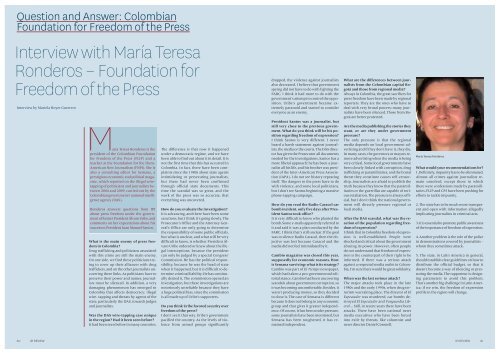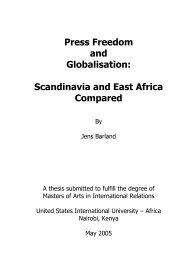FOCUS ON THE AMERICAS - International Press Institute
FOCUS ON THE AMERICAS - International Press Institute
FOCUS ON THE AMERICAS - International Press Institute
Create successful ePaper yourself
Turn your PDF publications into a flip-book with our unique Google optimized e-Paper software.
Question and Answer: Colombian<br />
Foundation for Freedom of the <strong>Press</strong><br />
Interview with María Teresa<br />
Ronderos – Foundation for<br />
Freedom of the <strong>Press</strong><br />
Interview by Mariela Hoyer Guerrero<br />
María Teresa Ronderos is the<br />
president of the Colombian Foundation<br />
for Freedom of the <strong>Press</strong> (FLIP) and a<br />
teacher at the Foundation for the Ibero-<br />
American New Journalism (FNPI). She is<br />
also a consulting editor for Semana, a<br />
prestigious economic and political magazine,<br />
which reported on the illegal wiretapping<br />
of politicians and journalists between<br />
2004 and 2009, carried out by the<br />
Colombian government’s national intelligence<br />
agency (DAS).<br />
Ronderos answers questions from IPI<br />
about press freedom under the government<br />
of former President Álvaro Uribe, and<br />
comments on her expectations about his<br />
successor, President Juan Manuel Santos.<br />
What is the main enemy of press freedom<br />
in Colombia?<br />
Drug trafficking and politicians associated<br />
with this crime are still the main enemy.<br />
On one side, we find these politicians trying<br />
to cover up their alliances with drug<br />
traffickers, and on the other, journalists uncovering<br />
these links. As politicians have to<br />
preserve their power and names, journalists<br />
must be silenced. In addition, a very<br />
damaging phenomenon has emerged in<br />
Colombia that affects democracy: illegal<br />
wire- tapping and threats by agents of the<br />
state, particularly the DAS, towards judges<br />
and journalists.<br />
Was the DAS wire-tapping case unique<br />
in the region? Had it been seen before?<br />
It had been seen before in many countries.<br />
The difference is that now it happened<br />
under a democratic regime, and we have<br />
been able to find out about it in detail. It is<br />
not the first time that this has occurred in<br />
Colombia. In fact, there have been complaints<br />
since the 1980s about state agents<br />
intimidating or persecuting journalists,<br />
but these had never been confirmed<br />
through official state documents. This<br />
time the scandal was so great, and the<br />
work of the press was so accurate, that<br />
everything was uncovered.<br />
How do you evaluate the investigation?<br />
It is advancing, and there have been some<br />
sanctions, but I think it's going slowly. The<br />
Prosecutor’s Office and the Attorney General’s<br />
Office are only going to determine<br />
the responsibility of some public officials,<br />
but what is unclear, and what will be very<br />
difficult to know, is whether President Álvaro<br />
Uribe ordered or knew about the illegal<br />
interceptions, because the president<br />
can only be judged by a special Congress’<br />
Commission. He has the political responsibility,<br />
because he was the head of state<br />
when it happened, but it is difficult to determine<br />
criminal liability. He has continually<br />
denied it. The commission opened an<br />
investigation, but these investigations are<br />
notoriously unreliable because they have<br />
a huge political bias, since the commission<br />
is all made up of Uribe’s supporters.<br />
Do you think Uribe favored security over<br />
freedom of the press?<br />
I don’t see it that way. Uribe's government<br />
pacified the country. As the levels of violence<br />
from armed groups significantly<br />
dropped, the violence against journalists<br />
also decreased. I believe that government<br />
spying did not have to do with fighting the<br />
FARC. I think it had more to do with the<br />
government's attempt to control the opposition.<br />
Uribe's government became extremely<br />
paranoid and started to consider<br />
everyone as an enemy.<br />
President Santos was a journalist, but<br />
still very close to the previous government.<br />
What do you think will be his position<br />
regarding freedom of expression?<br />
I think Santos is very different. I never<br />
heard a harsh statement against journalists,<br />
the media or the courts. The DAS director<br />
has given the Prosecutor all documents<br />
needed for the investigations. Santos has a<br />
more liberal approach; he has been a journalist<br />
all his life, and his brother was president<br />
of the Inter-American <strong>Press</strong> Association<br />
(IAPA). I do not see history repeating<br />
itself. The dangers to the press have to do<br />
with violence, and some local politicians,<br />
but I don’t see Santos beginning a massive<br />
phone-tapping campaign.<br />
How do you read the Radio Caracol car<br />
bomb incident, only five days after President<br />
Santos took office?<br />
It is very difficult to know who planted the<br />
bomb. Some e-mails apparently referred to<br />
it and said it was a plan conducted by the<br />
FARC. I think that's still unclear. If the goal<br />
was to silence Radio Caracol, then the objective<br />
was lost because Caracol and the<br />
media did not feel intimidated by it.<br />
Cambio magazine was closed this year,<br />
supposedly for economic reasons. How<br />
is Semana surviving; what is its strategy?<br />
Cambio was part of El Tiempo newspaper,<br />
which had taken a pro-governmental editorial<br />
stance. Cambio had been uncovering<br />
scandals about government corruption, so<br />
it was becoming uncomfortable. Besides, it<br />
wasn’t producing money, so they decided<br />
to close it. The case of Semana is different<br />
because it does not belong to any economic<br />
group and that gives it greater independence.<br />
Of course, it has been under pressure,<br />
some journalists have been monitored, but<br />
Semana has been toughened, it has remained<br />
independent.<br />
What are the differences between journalists<br />
from the Colombian capital Bogotá<br />
and those from regional media?<br />
Always in Colombia, the great sacrifices for<br />
press freedom have been made by regional<br />
reporters. They are the ones who have to<br />
deal with very brutal powers; many journalists<br />
have been silenced. Those from Bogotá<br />
are better protected.<br />
Are the media publishing the stories they<br />
want, or are they under government<br />
pressure?<br />
The only pressure is that the regional<br />
media depends on local government advertising<br />
and if they don’t have it, they die.<br />
In many cases, the governors or mayors remove<br />
advertising when the media is being<br />
very critical. Some local governments have<br />
been closely linked with corruption, drug<br />
trafficking or paramilitaries, and the brutal<br />
threat they constitute causes self-censorship.<br />
Journalists are afraid to publish the<br />
truth because they know that the paramilitaries<br />
or the guerrillas are capable of serious<br />
retaliation. The pressure is always official,<br />
but I don’t think the national government<br />
will directly pressure regional or<br />
local media.<br />
After the DAS scandal, what was the reaction<br />
of the population regarding freedom<br />
of expression?<br />
I think that in Colombia freedom of expression<br />
is well-established. People were<br />
shocked and critical about the government<br />
abusing its power. However, often people<br />
do not understand that freedom of expression<br />
is the counterpart of their right to be<br />
informed. If there was a serious attack<br />
against a respected media outlet in Colombia,<br />
I'm sure there would be great solidarity.<br />
When was the last serious attack?<br />
The major attacks took place in the late<br />
1980s and the early 1990s, when drug terrorism<br />
was taking place. The director of El<br />
Espectador was murdered, car bombs destroyed<br />
El Espectador and Vanguardia Liberal…<br />
Still, in recent years there have been<br />
attacks. There have been national news<br />
media executives who have been forced<br />
into exile by threats, like columnist and<br />
news director Daniel Coronell.<br />
María Teresa Ronderos<br />
What would your recommendations be?<br />
1.Definitely, impunity has to be eliminated.<br />
Almost all crimes against journalists remain<br />
unsolved, except those in which<br />
there were confessions made by paramilitaries.<br />
FLIP and CPJ have been pushing for<br />
efforts to tackle impunity.<br />
2. The state has to be much more transparent<br />
and open with information allegedly<br />
implicating journalists in criminal acts.<br />
3. It is essential to promote public awareness<br />
of the importance of freedom of expression.<br />
4. Another problem is the role of the police<br />
in demonstrations covered by journalists –<br />
whom they sometimes attack.<br />
5. The state, in Latin America in general,<br />
should establish clear guidelines on how to<br />
distribute the official budget, so that it<br />
doesn’t become a way of silencing or pressuring<br />
the media. The rapporteur is designing<br />
parameters to avoid this problem.<br />
That's another big challenge in Latin America;<br />
if we win, the freedom of expression<br />
profile in the region will change.<br />
60 IPI REVIEW IPI REVIEW 61

















